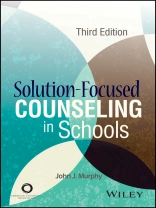The third edition of this widely adopted text covers the philosophical foundations and nuts-and-bolts of using solution-focused counseling to help preschool-12 students resolve problems. Dr. Murphy’s practical and respectful approach has been successfully applied throughout the world by school counselors, counselors-in-training, psychologists, social workers, teachers, administrators, and clinicians who work with young clients. His empowering techniques help students focus on doing what works as simply and efficiently as possible by using their strengths, resources, wisdom, and feedback.
This edition includes new chapters and information on the restrictive influence of problems, strategies for building positive relationships, collecting client feedback to monitor and improve services, and coconstructing solvable problems and reachable goals. Real-life case examples, sample dialog from counseling sessions, discussion and practice exercises, troubleshooting tips, and new and expanded appendixes enhance the book’s classroom and clinical utility. A complimentary test manual and Power Point slides for instructors’ use are available by written request to ACA.
*Requests for digital versions from ACA can be found on www.wiley.com.
*To purchase print copies, please visit the ACA website
*Reproduction requests for material from books published by ACA should be directed to [email protected].
Tabela de Conteúdo
Preface ix
Acknowledgments xiii
About the Author xv
Part One Foundations of Solution-Focused Counseling
Chapter 1 The Problem With Problems: Introduction to Solution-Focused Counseling 3
Chapter 2 Empirical and Conceptual Foundations 19
Chapter 3 Therapeutic Influences, Values, and Assumptions 47
Part Two Tasks and Techniques of Solution-Focused Counseling
Chapter 4 Building Collaborative Relationships 71
Chapter 5 Coconstructing Solvable Problems and Practical Goals 109
Chapter 6 Building on Exceptions 137
Chapter 7 Building on Student Resources 171
Chapter 8 Changing the Viewing 195
Chapter 9 Changing the Doing 221
Chapter 10 How and When to End Counseling 239
Part Three Troubleshooting, Other Applications, and Getting Started
Chapter 11 Troubleshooting When Things Don’t Go as Planned: 10 Tips 247
Chapter 12 Other Applications of Solution-Focused Practice in Schools 255
Chapter 13 Putting Solution-Focused Practice Into Immediate Action 267
References 273
Appendix A Client Index 285
Appendix B The Dot-Joining Puzzle and Solution 293
Appendix C Implementing the Partners for Change Outcome Management System in Schools: Practical Guidelines and Examples 295
Appendix D Outcome and Session Rating Scales 303
Appendix E Solution Identification Scale and Quick Survey 313
Appendix F Letters and Documents That Empower Progress 317
Appendix G Tasks of Solution-Focused Counseling 323
Appendix H Format for First and Later Sessions 325
Appendix I Instructions for Self-Modeling 329
Appendix J Items for Solution-Focused Referral Forms 331
Appendix K Websites 333
Index 335
Sobre o autor
John J. Murphy, Ph D, is a licensed psychologist and profes-sor of psychology and counseling at the University of Central Arkansas.












